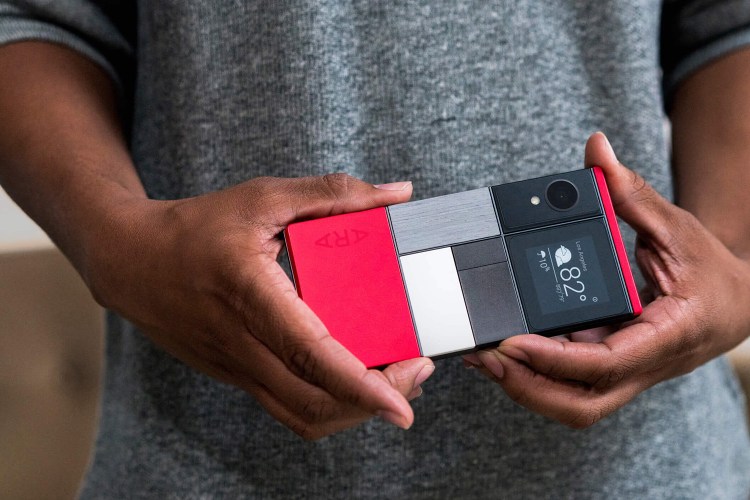Google’s ambitious plan to bring modular smartphones to market, Project Ara, has been suspended.
While there’s still a chance that Google will breathe new life into Ara by licensing it to third parties, the company — plagued by delays and talent drain — long ago abandoned its original vision: to dramatically reduce e-waste and bring an “open hardware ecosystem” to billions of people.
In light of Google’s shrinking ambitions for modularity, here’s a brief look at the history of Project Ara and the dashed hopes of those involved.
- September 10, 2013: Dutch designer Dave Hakkens publishes a video outlining his vision of “Phonebloks,” a modular smartphone designed to curtail smartphone waste. The project promptly goes viral.
- October 28, 2013: Motorola, then owned by Google, unveils “Project Ara”: a plan to “bring the benefits of an open hardware ecosystem to 6 billion people.” According to Motorola, the project had already been in development “for over a year” within its Advanced Technology, and Projects group (ATAP) and would now join forces with Hakkens and the Phonebloks community. Motorola aims to release an alpha version of a “Module Developer’s Kit (MDK)” that winter.
- January 29, 2014: Google sells Motorola Mobility to Lenovo, keeps Motorola’s ATAP group, including Project Ara, among other things.
- February 20, 2014: Google unveils Project Tango, Google’s other ambitious smartphone project.
- February 27, 2014: Google plans 2015 release of basic $50 modular phone with only Wi-Fi connectivity.
- April 4, 2014: Google previews prototype of Ara’s main “Endo” module.
- April 10, 2014: One month behind schedule, Google releases its Module Developers Kit (MDK), a guide detailing technical design ideas and plans for Ara.
- July 2, 2014: The lead designer for Project Ara, Dan Makoski, departs.
- July 14, 2014: Google begins accepting applications for Ara developer boards for developers interesting in building modules.
- October 29, 2014: Video of Spiral 1, the first working Ara prototype, is released. The prototype was developed by NK Labs.
- January 14, 2015: Google unveils second Ara prototype, Spiral 2, with a 3G modem, 11 unidentified prototype modules, and colorful module designs. The Ara team scraps its heavy dependence on 3D printing for “a dye sublimation process.” VentureBeat goes hands-on. Google also announces a Puerto Rico “market pilot,” with plans to kick it off sometime in 2015.
- April 28, 2015: A startup called Nexpaq launches a Kickstarter project for a modular smartphone case that was in development for “over two years.”
- June 1, 2015: Project Ara technical lead, Paul Eremenko, departs for Airbus.
- August 2015: Following the formation of Google parent company Alphabet, ATAP remains inside Google.
- August 17, 2015: Google cancels Puerto Rico-specific pilot, plans 2016 pilot.
- February 21, 2016: LG unveils semi-modular G5 smartphone with expansion slot.
- April 14, 2016: Facebook poaches the leader of Google’s ATAP group, Regina Dugan.
- May 20, 2016: Google says its Ara modular smartphone will be ready for sale in 2017 and promises to release a developer edition in the fourth quarter of 2016. The company announces that its base frame will contain “all the functionality of a smartphone.” Google releases new teaser video spotlighting the potential of swappable modules.
- May 28, 2016: Phonebloks creator Hakkens criticizes Google for deciding to build core parts of the Ara smartphone into the frame, possibly undermining Hakkens’ vision of reducing e-waste. Hakkens says Ara should be an “open standard” and “shouldn’t be in the hands of one organization.”
- June 9, 2016: Motorola, birthplace of Project Ara, unveils Moto Z smartphone with modular backplates.
- August 2016: Former ATAP and Ara design chief Makoski quietly begins working with Nexpaq through his consultancy firm, Garage Partners.
- September 1, 2016: A Reuters report claims that Google is “shelving” Ara, but suggests that it may license the project to third-party hardware companies.
- September 2, 2016: Google confirms to VentureBeat that it has suspended Project Ara.
Updated 6:20 p.m. PT with details on Makoski’s arrangement with Nexpaq.


